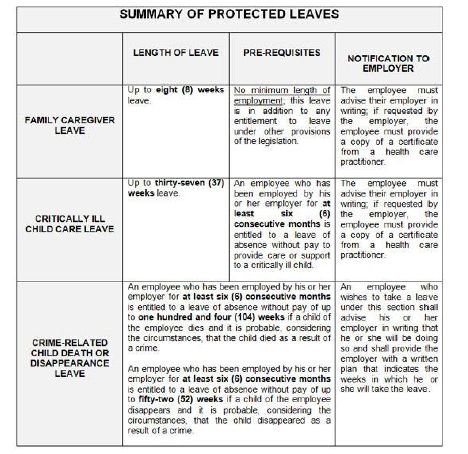Labour & Employment Law Bulletin – July 2014
Update on Job Protected Leaves
On April 29, 2014, the Ontario Legislature passed Bill 21, Employment Standards Act (Leaves to Help Families), 2014, an amendment to the Employment Standards Act, 2000 (the “Act”) that will come into force on October 29, 2014.
The amendment introduces three new job protected leaves under the Act: a Family Caregiver Leave, a Critically Ill Child Care Leave, and a Crime-Related Death and Disappearance Leave.
Family Caregiver Leave
Employees are entitled to up to eight (8) weeks of unpaid leave a year to provide care and support for a family member with a “serious medical condition.” Family members may include a child, spouse, sibling, parent, grandparent and also the employee’s or the employee’s spouse’s step- or foster parent or child.
The Family Caregiver Leave builds on the existing Family Medical Leave which provides employees with the opportunity to provide care or support to certain family members suffering from serious medical conditions with a significant risk of death. Employees are entitled to the Family Caregiver Leave regardless of their length of employment.
To be eligible for the Family Caregiver Leave, an employee must provide their employer with written notice and, if requested, a certificate from a qualified health practitioner in support of the requested leave.
Critically Ill Child Care Leave
To be eligible for the Critically Ill Child Care Leave, employees must be in the service of the employer for at least six (6) consecutive months.
The Critically Ill Child Care Leave entitles employees to up to 37 weeks of unpaid leave to provide care and support for a critically ill child.
The employee must provide the employer with certification of the critical illness from a qualified health practitioner that sets out the period during which the critically ill child requires care or support.
Crime-Related Death and Disappearance Leave
The Crime-Related Death and Disappearance Leave is only available to employees employed for a minimum of six (6) consecutive months.
If it is probable that an employee’s child has disappeared as a result of a crime, an employee is entitled to up to 52 weeks of unpaid leave. However, an employee is eligible for up to 104 weeks of unpaid leave if it is probable that their child has died as a result of a crime.
The leave is not available if the employee is charged with the crime or if the employee’s child is a probable party to the crime.
In light of these new job protected leaves, employers should consider taking the following steps:
- Review existing leave policies, procedures and, if applicable, collective agreements;
- Create protocols to receive and address leave requests; And
- Consider how to deal with potentially lengthy absences of certain employees once the legislation comes into force.

Hot off the Press
In a recent June 27, 2014 decision, the Supreme Court of Canada ruled that Wal-Mart Canada Corp. (“Wal-Mart”) violated Quebec’s Labour Code when it closed down its Jonquière establishment following a successful certification of its workers by a union.
The Supreme Court held that Wal-Mart’s closure of the Jonquière establishment was a violation of the statutory freeze provision in the Quebec Labour Code, which precludes an employer from altering the conditions of employment during the negotiation of a collective agreement.
The precise remedy has yet to be decided, and has been sent back to the Arbitrator for determination. Given the broad range of remedies available to an arbitrator, this case is far from finished.
Article by Lorenzo Lisi